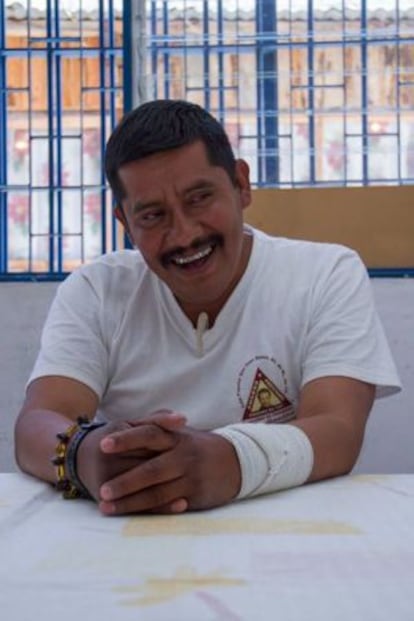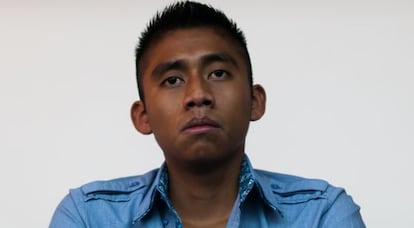A Mexican “patron saint” of social outcasts
Peña Nieto dedicates new pardons law to Tzotzil schoolteacher unjustly accused of murder

The poor, the indigenous communities, those who work from sunrise to sunset for a miserable wage, those who risk their lives crossing the border, the people nobody remembers, and countless other forgotten ones now have a name to invoke in Mexico - Alberto Patishtán.
In a country where the poor are accustomed to being on the losing end, 42-year-old Patishtán can be considered a winner. A Tzotzil community leader and schoolteacher who was unjustly imprisoned for 13 years, he has won over the president of Mexico, Enrique Peña Nieto - a near unapproachable figure for anyone of Patishtán’s social status.
Peña Nieto, of the Institutional Revolutionary Party (PRI), granted him a special pardon, which the president was expected to sign late Thursday, that closes a painful chapter in Mexico’s ongoing social struggle and will hopefully mark a new beginning. The so-called Patishtán’s Law will be presented to a nation that has countless cases like his on the books.
A paradigm of the judicial inequality often suffered by the poor, Patishtán had spent years demanding dignified treatment. He was sentenced to 60 years in prison for killing seven policemen in a forest region of Chiapas state, which is still reeling from the Zapatista uprisings of the 1990s. His trial was marred by irregularities.
But his tenacity and the continued support of many social organizations, which took up Patishtán’s struggle as their own cause, influenced President Peña Nieto’s decision to reform the criminal code and seek to close an unfortunate episode in Mexico’s history.
During these years at the Cereso 5 prison in San Cristóbal, where he taught many illiterate inmates who did not even understand their own prison sentences, he became something of an icon for Mexico’s social outcasts.
Subcomandante Marcos - the ideologue and leader of the Zapatista Army, a movement with which Patisthán identified - and the Catholic bishops in the area all came out in his defense. Author John Berger sent him lines of a song by the late Chilean revolutionary singer/composer Víctor Jara: “Into your open / hands / I place my singer’s guitar / the hammer of the miners / the peasant’s plough.”
Patisthán had always been more concerned about the problems of others rather than his own. The day they told him in his cell that he would spend the rest of his life there, he didn’t cry. Instead he had to wipe away the tears of the inmates who gathered around him in the courtyard, clinging to his words like a lifeline. Days later, in March 2012, he received an EL PAÍS reporter and recalled that scene: “It was bad news but I am at peace. I know I am innocent. I had to comfort them, telling them that there is hope. Do not cry, I told them.”
It all began in 2000. Patishtán was a teacher in a bilingual school and a member of the local education union’s chapter in his town, El Bosque. Among the residents, he was considered a charismatic man who was concerned about Tzotzil’s indigenous community. Patishtán was one of the leaders of a string of protests against the mayor, whom they accused of nepotism and abuse. From the state capital of San Cristóbal de las Casas, officials grew concerned and sent a squad of federal police to prevent an uprising.
During one of their patrols in a jungle area, a police unit was cornered by a heavily armed commando group who gunned down the officers. Seven people were killed in the attack while two survived: the mayor's son and a police officer. Both told the authorities that they saw Patishtán holding an AK-47, but later reported that the gunmen wore ski masks. One statement was taken after another until the teacher was charged with the murders.

Patishtán’s own witnesses, who placed him far from the scene that day, were never taken into account by the court.
But in the end, Patishtán would win thanks to the help of a small man with horn-rimmed glasses and resolute spirit. In 2012, human rights lawyer Leonel Rivero took Patishtán’s case and fought it all the way to the Supreme Court. But despite having the support from some prominent judges and presenting strong evidence that the allegations were based on lies, Rivero lost the legal battle.
Not to be discouraged after exhausting all of his judicial options, Rivero chose the political route.
In January, he met with Interior Secretary Miguel Ángel Osorio Chong, who serves as Peña Nieto’s chief of staff. His intention was to pick the brains of the new PRI administration that had just taken office in December 2012. “Would the president be interested in this case?” he asked.
Before the meeting, Jaime Martínez Veloz, the official designated by Peña Nieto to strengthen dialogue with indigenous peoples who also participated in peace talks with the Zapatistas in the 1990s, prepared the ground. It was his mediation that would open a new door.
“The president wishes to solve the Patishtán problem,” Osorio Chong said. This could have been a cold, bureaucratic use of language developed by the PRI after decades of holding power, but the idea was there: they had to solve the problem.
By that time Patishtán had become a global symbol of the oppression suffered by indigenous people around the world. International organizations had papered the streets with his photo and spread his name across the globe. In the center of Madrid, where squatters took over abandoned buildings, concerts were held to pay tribute to Carlos Palomino, a young man who was killed by a right-wing supporter in the depths of the Metro, and to Patishtán, whose story they had heard from others: this was a teacher who fought for his values and beliefs in Chiapas, a government-oppressed state, which is also home to the Zapatistas.
After months of political study, the PRI government concluded that the best way to resolve this matter was to reform the Federal Criminal Code and give the president the power to grant pardons to anyone convicted in a trial that was considered flawed - Patishtán’s Law. It is a new executive privilege that never existed in Mexico.
On October 23, the Senate approved the reform and the government wasted no time in announcing the pardon - Patisthán is suffering from a brain tumor he developed in prison and is in the middle of treatment.
Patishtán's son, Héctor, is dark-skinned with short black hair. He was just a boy when his father was arrested. Even though he expresses himself in the language of the social struggle, a battle he knows all too well, his words come directly from the heart. “Do I care whether my father receives a pardon rather than be declared innocent? We had to break the prison wall this way, or with a bulldozer.”
And he adds: “My father will live in Mexico City or in Chiapas, depending where he will need his treatment. But it doesn’t matter; there is enough social injustice to go around that need to be defeated.”
The forgotten ones now have someone to dry their tears; Patishtán has enlightened them.
Tu suscripción se está usando en otro dispositivo
¿Quieres añadir otro usuario a tu suscripción?
Si continúas leyendo en este dispositivo, no se podrá leer en el otro.
FlechaTu suscripción se está usando en otro dispositivo y solo puedes acceder a EL PAÍS desde un dispositivo a la vez.
Si quieres compartir tu cuenta, cambia tu suscripción a la modalidad Premium, así podrás añadir otro usuario. Cada uno accederá con su propia cuenta de email, lo que os permitirá personalizar vuestra experiencia en EL PAÍS.
¿Tienes una suscripción de empresa? Accede aquí para contratar más cuentas.
En el caso de no saber quién está usando tu cuenta, te recomendamos cambiar tu contraseña aquí.
Si decides continuar compartiendo tu cuenta, este mensaje se mostrará en tu dispositivo y en el de la otra persona que está usando tu cuenta de forma indefinida, afectando a tu experiencia de lectura. Puedes consultar aquí los términos y condiciones de la suscripción digital.








































